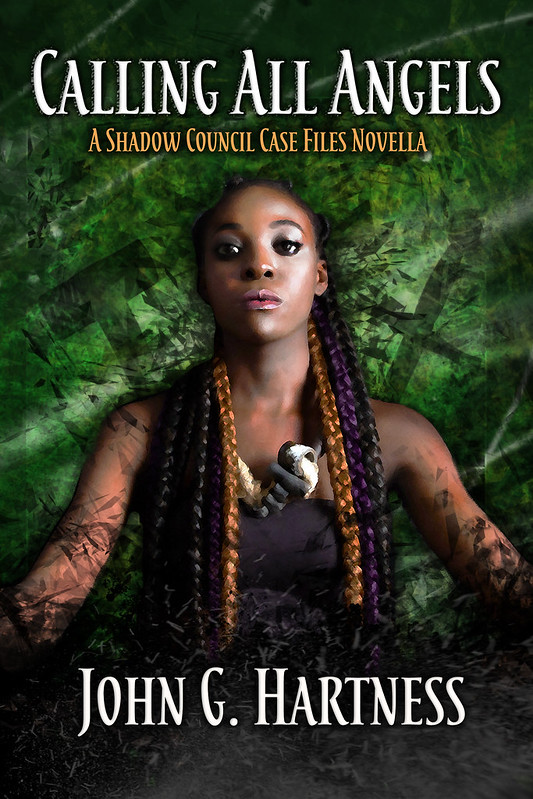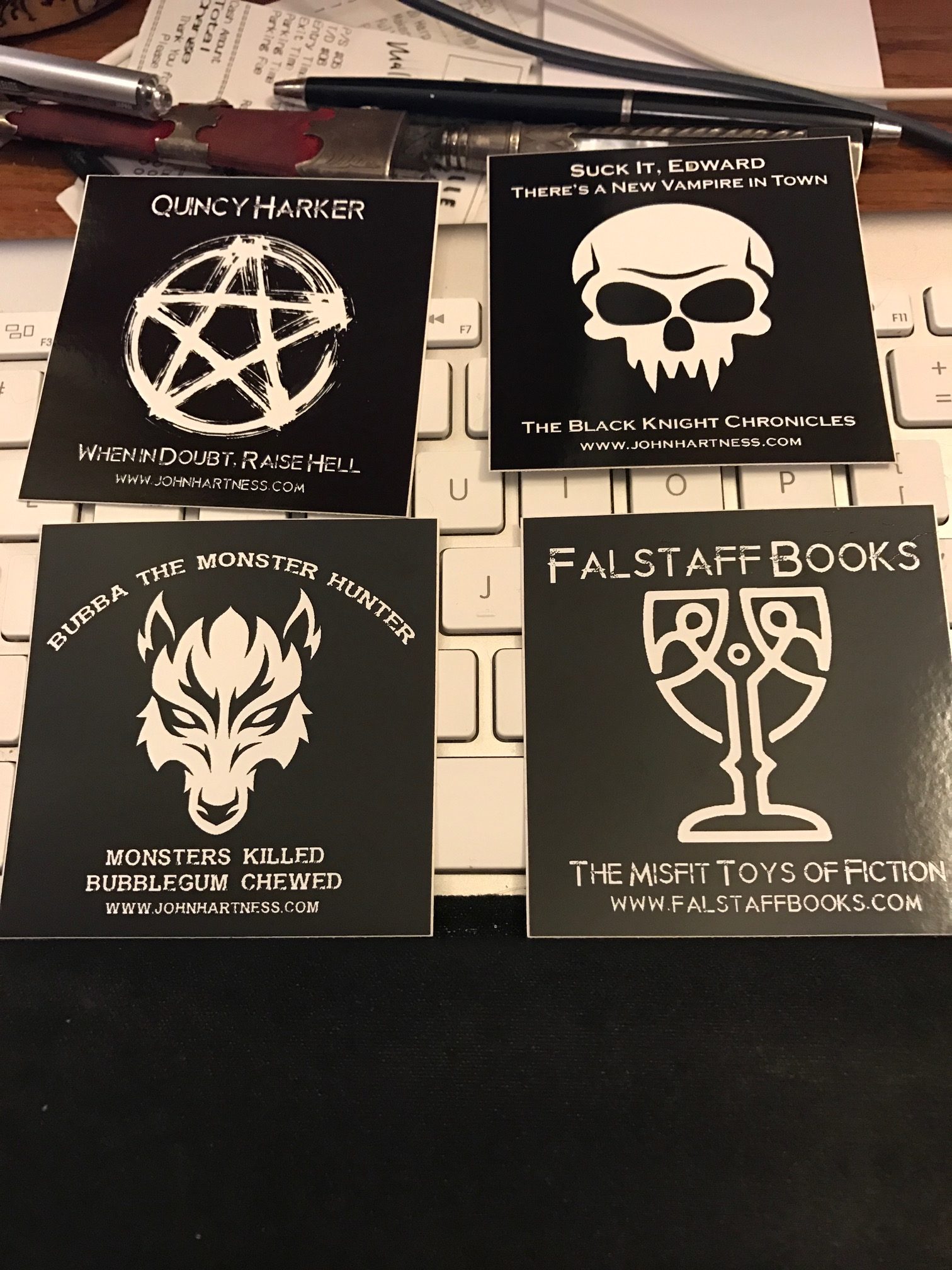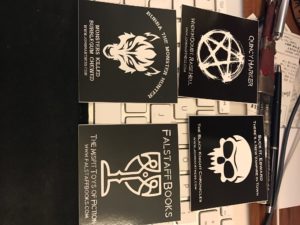by john | Mar 6, 2017 | Amazing Grace, Fiction, Serialized Fiction, Writing
4
It ain’t easy knocking on the door of a house that’s grieving, especially when you know it’s a child that’s passed. The Miller house looked like about any other house in one of them new planned neighborhoods, called Evergreen Acres, with all the streets named after trees. Of course, not a one of the trees they named a street after is an evergreen, so the Millers lived on Maple Lane. I shook my head at how dumb some developers can be as I pulled up on the street outside their house.
There were a few cars in the driveway and on the side of the road, but not too many. It was the day after the funeral, and most of the family from out of town had already gone, leaving the poor child’s mama and daddy to start trying to put their lives back together. And here I was to tear it apart again.
Reverend Aaron Turner answered the door, a scowl making his face look even more sour than usual. The Baptist preacher always looked like somebody shoved a lemon in his mouth and clamped his jaw shut, or maybe stuck that lemon someplace a little further south. But whenever he saw me, his face scrunched up like he just took a bite of something rotten and didn’t have nowhere to spit it out. I was not going to be able to talk to the parents with him in the house. I’d be surprised if I got into the house at all, given the good reverend’s dim view of me and my gifts. The kindest thing he’d ever called me was a fraud, and it went decidedly downhill from there.
“Reverend,” I said, so polite that butter wouldn’t melt in my mouth. I held out the white Pyrex dish with blue flowers on it. “I brought a chicken pot pie. Figured these folks might be tired of broccoli and green bean casseroles by now.”
“That’s mighty kind of you, Ms. Carter. I’ll be sure to pass it along, with your condolences of course.” He stepped back and made to close to the door on me, but he had to hold the dish with both hands on account of the bottom being too hot for him to manage it one-handed. That made him slow getting the door closed in my face, and I pushed my way just across the threshold and held the door open with my foot.
“I don’t mind coming in for a minute to pay my respects. My circle wanted me to say something to Mrs. Miller on our behalf.” I wondered if it was a worse sin lying to a preacher than just lying in general, because the women in my church circle group didn’t have a damn thing to do with me being there, and had no idea I was using their names in vain. They wouldn’t have cared about that, but the lying to a preacher thing would have given Tot Good a little pause, at least.
“That won’t be necessary,” Reverend Turner insisted through gritted teeth. The man did not want me in that house, particularly right then. I started to wonder if there was more to his insistence than just his general dislike for me and his completely unfounded opinion that I sold my soul to the devil.
“Who’s at the door, Aaron?” The voice coming from within the house was familiar, but I couldn’t put a name to it. That was odd, since I’d known most everybody in town for years.
The little bit of light coming from within the house was blotted out by the big frame of Sheriff Dunleavy stepping into the doorway between the parlor and the foyer. “Ms. Carter? How are you doing?” the sheriff asked, walking over to me, a grin splitting his face. I trusted his intentions about like I trusted a crying crocodile. A smiling lawman is never honest about his intentions. I liked my police like I liked my undertakers – solemn and grim.
“I’m fine, Sheriff. I just brought this chicken pot pie and my respects to the Millers. I heard about Jenny and just felt awful about it.” I pushed past Reverend Turner and shook the sheriff’s hand. “Are you here officially, or just being a sympathetic ear?”
“I’m here in an official capacity, I hate to say,” Dunleavy said. “There were a couple of strange things that came up in the autopsy that I need to go over with Mr. And Mrs. Miller.”
“What kind of strange things, Sheriff?” I asked. I knew it wasn’t my business, and a big-city cop would never tell me squat, but I had a little hope that my hokey charm would soften Dunleavy up a touch.
No such luck. “I’m sorry, Ms. Carter. I can’t comment on an ongoing investigation. I’ve said too much already. If you’ll excuse me,” he stepped past me toward the door and nodded to Turner. “Reverend.”
“Sheriff,” the preacher nodded back in that silent acknowledgment men do. Sheriff Dunleavy continued out the door and down the steps. I didn’t see what car he got into, but it must have been his personal one. I would have noticed a police cruiser in the driveway, even if I missed Reverend Turner’s big old black Lincoln Town Car with the Clergy sticker on his bumper. The man was just a little ostentatious for my tastes, with his perfectly creased pants and his big shiny car. I could tolerate fancy or judgmental, but I didn’t do good when one package wrapped up both irritating traits. And Turner was fit to bursting at the seams with both.
“You need to leave, Ms. Carter. This family has been through enough without your interference and crazy stories,” the preacher said in a low voice. He practically hissed at me, the bald-headed little snot. I thought, not for the first time, that Reverend Turner probably got beat up a lot in school. Not because the other children were terribly cruel, which they could be, but because he was such a little bastard.
“You’re right, Reverend.” I said, sugar practically dripping off my tongue. “These fine folks have lost everything that matters to them right now. I should leave them alone to their grief. My name is on the bottom of the Pyrex, so they can return it whenever they’re done. But don’t you go putting that dish in the refrigerator while it’s still hot. It’ll cool down too fast and explode.”
“I know that, Lila Grace. What do you take me for, a moron?”
I didn’t answer that, I just turned and left the house. After all, my mama always said if you can’t say something nice about somebody, don’t say nothing at all.
“What are you doing?” Jenny asked as I walked down the steps on the front porch. “Why are you leaving? Talk to me, dammit!”
I tried very hard to keep my voice low and not move my lips much as I walked to the car. There was a steady trickle of people walking up to the front door, most of them carrying Pyrex, but a few with KFC buckets and one or two even carrying grocery bags with paper plates and the like.
“I am leaving because it will not do us any good to get in a fight with a preacher on your front porch. I can come back this evening when he is leading his choir practice, and have a much better chance of talking to your mama and daddy without causing a scene.”
“Well, where are we going now?” She asked, fading through the passenger door of my truck and settling into the seat. She turned half around, reaching for the seatbelt, then laughed a little. “I guess I don’t have to worry about seatlbelts now, do I?”
“No, honey, I think you’re beyond those problems. And since the only lawman in town who can see you is Sheriff Johnny, you’re probably safe from getting a ticket, too. Speaking of lawmen, we’re going to see Sheriff Dunleavy to ask him what was squirelly in your autopsy. Could be he has some information that might be useful to us, and we certainly have some that he should find interesting.”
I pulled the pickup out onto the street and drove around the block, then headed toward the sheriff’s office. There was a familiar white Prius sitting in the Sheriff’s parking lot, and now I knew what Dunleavy’s car looked like. I could count the number of hybrids in Unionville on one hand and have a thumb to spare, so it wouldn’t be any trouble seeing the Sheriff coming from a mile away, even if he wasn’t in his official vehicle.
I walked through the front door, wincing at the loud electronic beeeeeep that accompanied me. Sheriff Johnny had a bell on a metal arm over the door, like in an old hardware store, and it was still unnerving to me the new technological sound that came with the new high-tech lawman.
“Come on in, Ms. Carter,” Sheriff Dunleavy called from his office. “I didn’t expect it would take you very long to get here.”
“Well, then you might just be sheriff enough to take care of this county,” I said. I walked into his office and paused at the door. The “lawyer chair” had been replaced, and a new chair with arms sat in its place. I sat down in the new chair, testing the soft leather. There was no wobble, and it sat just a little high, putting the occupant almost at eye level with the person sitting behind a desk. Obviously this new sheriff didn’t think he needed any help intimidating people. That in itself was a little bit intimidating.
“The old chair had one leg shorter than the other. Imagine that,” the sheriff said, sitting down behind his desk. He motioned to a Styrofoam cup on the front edge of his desk. “I fixed you an ice water.”
I picked up the cup and took a sip. It was very cold. “Thank you, Sheriff. You have been expecting me.”
“You seem like somebody who takes an interest in things that aren’t quite ordinary,” he said with a mild smile.
“That sounds an awful lot like a polite way of calling me a busybody, Sheriff,” I replied, fixing my own smile firmly on my face. It seemed like we were going to sit here and play the “bless your heart” game for a little while, where we made snide little comments hidden in well-mannered sentences before finally abandoning our pretenses and getting down to business.
But the Sheriff had a surprise in store for me. He leaned forward, put his elbows on his desk, and stared right at me. “I’ve asked around about you. Seems like most everybody here believes you can do what you say you can do. Even Reverend Turner, who thinks you’re in league with the devil, believes you can talk to the dead. Your own pastor, Dr. Reese, speaks very highly of your gifts and your willingness to help people. So either you’ve managed to fool an entire town, or you really do have some power to talk to dead folks.”
“Like I said when we first met, Sheriff, everybody around here talks to dead people. The only difference with me is that they talk back.” I leaned forward in my chair and looked him in the eye as I spoke.
“Well, exactly what are the dead telling you today?” he asked.
“They’re telling me that Jenny Miller didn’t fall down those stairs,” I replied.
“Do they know who killed her?”
“No, they don’t.”
“Then what good are they?”
“They’re dead, Sheriff, they aren’t Batman.”
He let out a deep echoing laugh and leaned back. “I like you, Lila Grace. Can I call you Lila Grace?”
“I wish you would, Sheriff.”
“You know why I like you?”
“Because I can help you solve murders?”
“No, because you ain’t scared of nothing! You have got bigger juevos than any man I’ve ever met. I respect that.”
“Well, that’s where you’re wrong, Sheriff,” I said. “There’s plenty of things I’m scared of. I’m scared of spiders, they give me the willies. I’m scared that the life I lead isn’t good enough to get me to Heaven, and when I walk up to the pearly gates, Saint Peter is going to laugh in my face and send me down to the other place. I’m scared that I really am crazy and just hallucinating all these dead people, and you, and driving around town, and I’m really down in Columbia on Bull Street tied to bed in a pair of Depends that ain’t been changed in two days with everybody ignoring my screaming because they’re tired of listening to this old woman’s mouth. I’m scared of sunspots, because I watch too much PBS. I’m scared of the government, because I watch too much C-Span. I’m scared of getting cancer from watching too much TV, and I’m scared that I won’t be smart enough, or strong enough, or good enough to find who murdered the beautiful little girl that’s sitting in your other chair right now unable to be seen or heard by anybody in the world but me, and that she will wander this earth forever instead of going to Heaven to see her Granny again like she deserves.”
I leaned back and took a drink of water. “So there are plenty of things that scare me, Sheriff. Just none of them scare me as much as letting this little girl down.”
by john | Feb 27, 2017 | Amazing Grace, Fiction, Serialized Fiction, Writing
The reception to this reading at Mysticon last weekend was great, so I guess I’ll keep on scribbling on it. Y’all know we love comments, right? And remember, this is strictly first-draft stuff, so there will probably be spelling errors and plenty of proof that I don’t really know where the commas go.
Chapter 3
I wasn’t too surprised to see Sheriff Johnny sitting in my living room when I walked in with Jenny in tow. The girl stopped, though, and when I sat down in my favorite chair, I noticed that she was still standing in the open french door frame between my dining room and den.
“Well, come on in, sweetie. He ain’t gonna arrest you. Not now, anyhow.” I smiled at her to let her know I was only joking, and waved her into the room.
She came into the room and sat on the couch. I’ve never understood how ghosts can sit on furniture, but they can’t turn a doorknob or handle other objects. Most of ‘em can’t, anyway. But for some reason, they can all sit on a chair or couch just like they still walked around breathing.
“Now, honey, let’s start with what Sheriff Johnny here likes to call the real police work.” I nodded to Johnny, and he smiled at me. He looked like he was only half paying attention to what we were talking about, but I knew he was listening a lot more to what me and that child said than he was listening to another In the Heat of the Night rerun. I mean, I like Carroll O’Conner as much as the next woman, but back to back episodes five days a week is a little much. But Sheriff Johnny has got hooked on it since he showed up at my door the morning after his funeral, all mute and confused and lost.
Some ghosts can talk, some can’t. I’ve never known what makes one of them able to communicate over another one, and it ain’t like I’ve been dead to ask anybody. But Sheriff Johnny was one of them that couldn’t speak, so he had to resort to bad sign language and gestures to get his point across. The two of us spent many an afternoon in recent months watching YouTube videos on sign language, and we got to a place where we could communicate with one another pretty good.
I reached over to the antique chest of drawers I got out of Miss Ellen Ferguson’s house when she passed, and I dug around in the top drawer until I found an ink pen and a little yellow notepad. I leaned forward to Jenny and asked, “Now who do you think would want to hurt you, sweetheart?”
“I can’t think of nobody, ma’am. And I mean it, too. Carla Combs was mad at me for getting Homecoming Queen, but she got over it when she beat me for class President. Matt Ridinger was mad at me for being named Salutatorian, but then his scholarship to Duke came through and he stopped caring about stuff around here. So I can’t think of anybody that would want to kill me.”
I looked over at Johnny, who wiggled his fingers in the air for a few seconds. I nodded, and turned back to Jenny. “What about any of the other girls on the cheerleading squad? I asked. “Did any of the girls on the bottom of the pyramid want to be on the top? Or vice versa, or whatever girls get made at each other about nowadays.”
She thought for a moment, then shook her head. “No, nothing like that. I was captain of the squad, but I didn’t make up any of the routines or decide anything about who got featured or anything like that. And I was on the bottom of the pyramid, because I had strong enough legs to hold up some of those little heifers.” The corner of one lip turned up a little sneer, and that was the thing I’d been waiting for – the hint of mean girl to come out.
It took me back, and not to somewhere I liked going. I went right back to seventh grade gym class and playing dodge ball. All the teams were picked except me and little Mikey Miller, who had braces on both legs and a lisp. Karen Taylor and Laura Anne Mays were arguing over who got “the gimp,” and who got stuck with “Crazy Gracie,” as I was called until my junior year of high school.
But Jenny’s sneer was gone as soon as it came over her, and she looked up at me. “I’m sorry,” she said. “I hate to call them names, that’s what Miss Hope called us all. We were her little heifers, and she was our Mama Moo-Cow. I think she got picked on in school because she was a big girl.” Well, I’ll be. Maybe this child really was as nice as she was acting. That was going to make it even harder to figure out who wanted to kill her.
Sheriff Johnny caught my eye, and I turned to see him wiggling his fingers to beat the band. “Slow down, Johnny. You know I ain’t watched them videos as many times as you have.” It was true, too. Sometimes I left the sign language videos running on a loop so Johnny could practice while I went to church, or the grocery store, or just out to piddle around in my garden. He’d gotten downright good at that stuff, and when he got excited, like he was now, sometimes he was too much for me to keep up with.
He stopped, then started again. I watched his wispy hands closely, glad he wasn’t too pale today for me to see all the details. Sometimes Johnny would get wispy in the middle of the day, only to grow sharper and more distinct as night fell.
I turned back to Jenny. “Sheriff Johnny was wondering if there was anybody that had a disagreement with your parents? Anybody that they argued with a bunch?”
“No, ma’am,” the girl said. “I mean, they got in little squabbles with Todd Ferguson about stuff at the church, and Mama didn’t shop at the Farmer’s Market no more since she caught that Riley girl putting her thumb on the scale when she was weighing her cucumbers, but nothing to come to no fights, or nothing like that. Daddy didn’t even owe nobody money, except the bank. And they ain’t usually the ones to go around pushing people down steps, are they?”
‘No, honey, I reckon they ain’t. Bankers are usually more sneaky than that.” Johnny was wiggling his fingers at me again, but I turned my head and ignored him. He hates that. Makes him madder than a frog on a frying pan to be ignored, but sometimes I had to use it like a mute button. Johnny had a bad habit of forgetting that he wasn’t Sheriff mo more. On account of being dead and all.
I stood up and walked to the kitchen. “You want something to drink, honey? I got sweet tea, and ice water. Oh, shoot, I’m sorry.” Sometimes I forget they ain’t ever gonna drink nothing again, especially the ones that can talk. I fixed myself some sweet tea in an old Tupperware tumbler and walked back into the den.
“I’m sorry about that, honey,” I said.
“It’s okay,” the girl said. “I ain’t quite used to it myself, yet. Being dead, I mean.” She got a pensive look on her face. “Do you know…why I’m still here? Does this mean I can’t go to Heaven?” She looked like she was going to cry, the poor thing. I knew better, cause ghosts can’t cry, but it’s still a good idea to keep the supernatural visitors on as even a keel as you can manage, emotionally speaking. When a ghost loses control of their emotions, things have a bad habit of flying around the room, and I had some nice Depression Glass piece in my china cabinet that I didn’t want to see get broken.
“I don’t know why you’re here, honey, but I’ve got an idea,” I said. “It seems like the people who don’t move on are either scared of what they’re going to find when they pass from this world, or there’s something unfinished keeping them here. Sheriff Johnny hangs around this old town because he ain’t convinced that the new Sheriff can take care of his people, so he tries to keep an eye on things. Miss Leila Dover doesn’t think her husband JR can take care of himself without her, not realizing that he took care of himself and her the last five years when her Alzheimer’s got so bad. And you got murdered, only nobody knows it, so ain’t nobody looking for your killer. So you want justice. I reckon when y’all get your outstanding issues resolved, so to speak, y’all will all move on to the land of harp music and fluffy clouds.”
“Are you sure?” The child looked scared to death, which I reckon was not a real good turn of phrase for her anymore.
“I ain’t sure of much, sweetie. If there’s anything I’ve learned in my fifty-seven years on this earth, it’s that we don’t know half of what we think we know, and we understand less than half of that. But I know this – if you were a good person, then you’ll end up Heaven. It don’t matter if you toilet papered an old lady’s house on Halloween, or skipped Sunday School more times than you went. It matters how you acted towards others, and whether or not you are really sorry for any harm you might have caused. I am not your preacher, and I am not here to cast judgement. But if I had to guess, I would think that once we figure out who pushed you down them stairs, you can move on to the next world and see anybody that’s waiting for you on the other side.”
“Like my Granny?” She said, smiling.
I remembered that child’s grandmother the second she said it. Vera Prustley was a foot-washing Baptist, as we called them. She was as devout a woman as any I’d ever known. Didn’t truck with playing cards or music on Sunday, but wasn’t rude about her religion, either. I didn’t know her too well, but she always had a friendly nod for me when we would pass in the grocery store, even when I was on the outs with my own church family. She had passed about six years ago, right about the time this child would have been in middle school. That’s about the time when children really start to understand death and grieving, so her Granny’s death was something she would have carried with her.
“Yes, darling,” I replied. “I think your Granny is almost certainly waiting to see you again. So let’s try to figure out where to go from here so you can go see Miss Vera again, and your killer can go straight to jail.”
Sheriff Johnny waved his arms so wildly I turned back to him. “Yes, Johnny?”
He wiggled his fingers at me, and I gave him a little smile. “I agree, Sheriff,” I said.
I turned back to Jenny. “Sheriff Johnny says your killer don’t need to go to jail, we need to send his sorry behind right to Hell.”

 I had the good fortune to sit down at Mysticon with my buddy Rod Belcher, who writes as R.S. Belcher, and talk about his evolution as a writer, how he got his book deal, how he landed a agent, and what he loves about the writing life. He’s a great guy, a funny guy, and a helluva writer. Here’s the interview in its entirety, also available on iTunes and pretty much wherever you get podcasts from.
I had the good fortune to sit down at Mysticon with my buddy Rod Belcher, who writes as R.S. Belcher, and talk about his evolution as a writer, how he got his book deal, how he landed a agent, and what he loves about the writing life. He’s a great guy, a funny guy, and a helluva writer. Here’s the interview in its entirety, also available on iTunes and pretty much wherever you get podcasts from.







